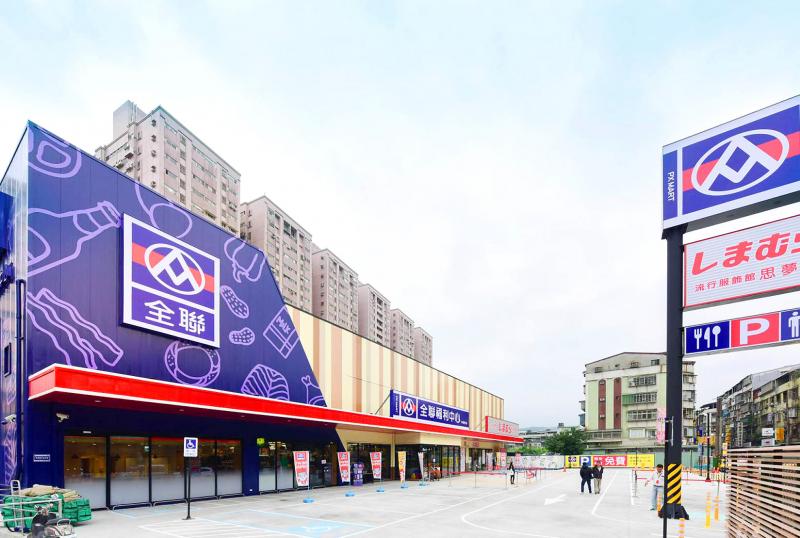The Fair Trade Commission (FTC) on Friday said that it had conditionally approved supermarket chain PX Mart Co Ltd’s (全聯實業) acquisition of hypermarket operator RT-Mart International Ltd (大潤發).
The overall benefits of the deal are expected to outweigh any disadvantages, the commission said, adding that it has imposed conditions on the deal to protect consumers and competition from possible abuse of PX Mart’s large market share.
The deal is expected to increase product delivery efficiency and reduce premature depletion of stock, the commission said.

Photo courtesy of PX Mart Co
The acquisition would also provide a better shopping environment after PX Mart completes renovations to RT-Mart outlets, it added.
Conditions of the deal include limiting retail price hikes to reflect wholesale cost increases, and a restriction on charging suppliers fees beyond what is found in the marketplace.
For instance, the companies are required to allow shelf space to suppliers without charge for at least three years, the commission said.
PX Mart in December last year acquired 95.97 percent of RT-Mart’s shares from France’s Auchan SA and Taiwan’s Ruentex Group (潤泰集團) for NT$11.5 billion (US$384.02 million).
RT-Mart is to continue operating as a separate brand, PX Mart said.

CHIP RACE: Three years of overbroad export controls drove foreign competitors to pursue their own AI chips, and ‘cost US taxpayers billions of dollars,’ Nvidia said China has figured out the US strategy for allowing it to buy Nvidia Corp’s H200s and is rejecting the artificial intelligence (AI) chip in favor of domestically developed semiconductors, White House AI adviser David Sacks said, citing news reports. US President Donald Trump on Monday said that he would allow shipments of Nvidia’s H200 chips to China, part of an administration effort backed by Sacks to challenge Chinese tech champions such as Huawei Technologies Co (華為) by bringing US competition to their home market. On Friday, Sacks signaled that he was uncertain about whether that approach would work. “They’re rejecting our chips,” Sacks

NATIONAL SECURITY: Intel’s testing of ACM tools despite US government control ‘highlights egregious gaps in US technology protection policies,’ a former official said Chipmaker Intel Corp has tested chipmaking tools this year from a toolmaker with deep roots in China and two overseas units that were targeted by US sanctions, according to two sources with direct knowledge of the matter. Intel, which fended off calls for its CEO’s resignation from US President Donald Trump in August over his alleged ties to China, got the tools from ACM Research Inc, a Fremont, California-based producer of chipmaking equipment. Two of ACM’s units, based in Shanghai and South Korea, were among a number of firms barred last year from receiving US technology over claims they have

It is challenging to build infrastructure in much of Europe. Constrained budgets and polarized politics tend to undermine long-term projects, forcing officials to react to emergencies rather than plan for the future. Not in Austria. Today, the country is to officially open its Koralmbahn tunnel, the 5.9 billion euro (US$6.9 billion) centerpiece of a groundbreaking new railway that will eventually run from Poland’s Baltic coast to the Adriatic Sea, transforming travel within Austria and positioning the Alpine nation at the forefront of logistics in Europe. “It is Austria’s biggest socio-economic experiment in over a century,” said Eric Kirschner, an economist at Graz-based Joanneum

France is developing domestic production of electric vehicle (EV) batteries with an eye on industrial independence, but Asian experts are proving key in launching operations. In the Verkor factory outside the northern city of Dunkirk, which was inaugurated on Thursday, foreign specialists, notably from South Korea and Malaysia, are training the local staff. Verkor is the third battery gigafactory to open in northern France in a region that has become known as “Battery Valley.” At the Automotive Energy Supply Corp (AESC) factory near the city of Douai, where production has been under way for several months, Chinese engineers and technicians supervise French recruits. “They